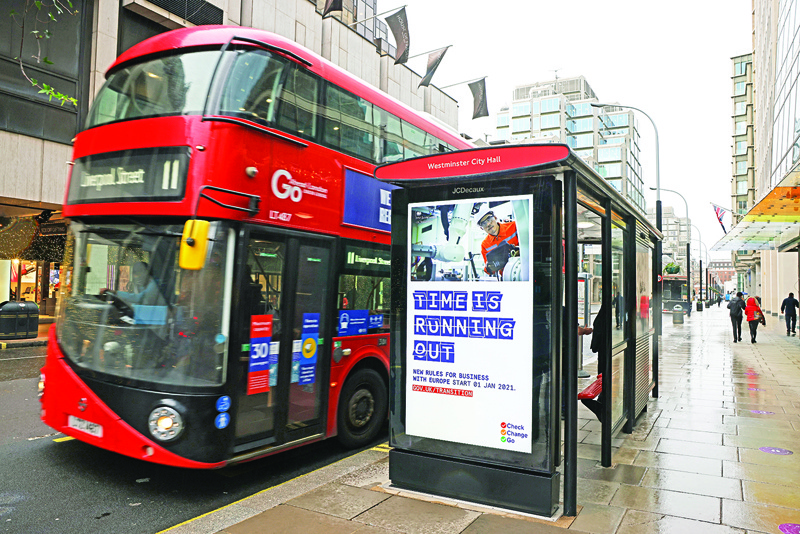
BRUSSELS: EU negotiator Michel Barnier yesterday signaled there was a "narrow path" to a post-Brexit trade deal with Britain, as key sticking points remain after both sides abandoned a supposed make-or-break deadline. British Prime Minister Boris Johnson and EU chief Ursula van der Leyen pledged to "go the extra mile" on Sunday as they side-stepped a self-imposed cut-off point to end talks if there was no progress towards a pact.
EU chief Ursula von der Leyen expressed satisfaction yesterday over talks with Britain to agree a post-Brexit trade pact, saying there was progress as negotiators entered the "last mile". "First of all there is movement. That is good… We are talking about a new beginning with old friends," she told a conference organized by the Organization for Economic Cooperation and Development (OECD).
"We are on the very last mile to go. But it is an essential one. We want a level playing field, not only at the start, but also over time," she added. "This is the architecture we are building. We are fine about the architecture itself, but the details in it-do they really fit? These are crucial points because it is a matter of fairness, fair competition and we want to ensure that." Her comments came as EU and British officials were set to return to the negotiating table yesterday after von der Leyen and British Prime Minister Boris Johnson agreed to abandon a supposed make-or-break weekend deadline.
French Finance Minister Bruno Le Maire had in a radio interview earlier warned that in the event of a no deal in the trade talks "the losers will be the British. We don't lose much." Johnson insists it remains "most likely" that Britain will crash out of the globe's largest single market on World Trade Organization (WTO) terms by year's end as the two sides spar over regulating future standards and fishing. But von der Leyen yesterday said "there is movement. That is good".
An EU diplomat said following a briefing from Barnier that "there might now be a narrow path to an agreement visible - negotiators can clear the remaining hurdles in the next few days". "There has been some progress in the negotiations over the last few days, but - sometimes substantial - gaps still need to be bridged in important areas like fisheries, governance and level playing field," the diplomat said. An EU source said there had been "fragile" progress.
Serious blockages
The source said there had been steps towards determining a mechanism to regulate future divergences in standards, but that there were seriously blockages "on all fronts" on the issue of fishing rights. "If there is progress on fishing then we could have an agreement in the coming days," the official said. Barnier was set to sit down in Brussels with his British counterpart David Frost for the latest round of talks aimed at thrashings out a deal before Britain leaves the EU's single market on December 31.
The chief EU negotiator said on Twitter that "the next few days are important" if a deal can be found and insisted the two sides had a "responsibility to give the talks every chance of success". Von der Leyen and Johnson have not set a new deadline as the definitive end date looms in just 18 days and there are fears that the talks could go right to the wire.
Irish Prime Minister Micheal Martin, whose country stands to be hit hard by a no-deal, told RTE that the "real end deadline is New Year's Eve, although I think both sides are very possessed of the need to try and get outcomes to these negotiations in the next number of days".
France's Europe Minister Clement Beaune said he did not expect the negotiations to go "beyond the coming week" as any deal would still need to be signed off by the 27 EU member states and British parliament. Key log-jams remains over on a raft of thorny issues and a second EU diplomat said there were "serious difficulties" on fishing rights, with London adamant it wants to assert full rights over its territorial waters.
Reports said that there had been some progress on determining a mechanism to regulate any future divergences in standards between the two sides, but work was still to be done. Britain insists it will not be tied in perpetuity to rules it claims would be set by Brussels. "Any deal that we get with the EU has to respect the fact that we are a sovereign country, we are an independent country and that's the basis on which we will do a deal if there's a deal to be done," Britain's Business Secretary Alok Sharma told journalists yesterday.
"Of course we are continuing to talk, that's what people expect. Where there is life there is hope." Britain left the EU in January and has been in a standstill period until the end of this month while both sides try to agree the terms of their new relationship. Without a deal, cross-Channel trade will revert to World Trade Organization rules, with tariffs driving up prices and generating paperwork for importers, and the failed negotiation could poison relations between London and the continent for years to come.
In London, the government insists that Britain is ready to leave the union and handle its own affairs after 47 years of close economic integration. Downing Street even says it has mapped out "every single foreseeable scenario" for problems after December 31, and "no one needs to worry about our food, medicine or vital supply chains". The government says it is ready to offer hefty new support for sectors in the firing line such as farming and autos, but British business groups are aghast at the lack of clarity on future trading rules. - AFP










